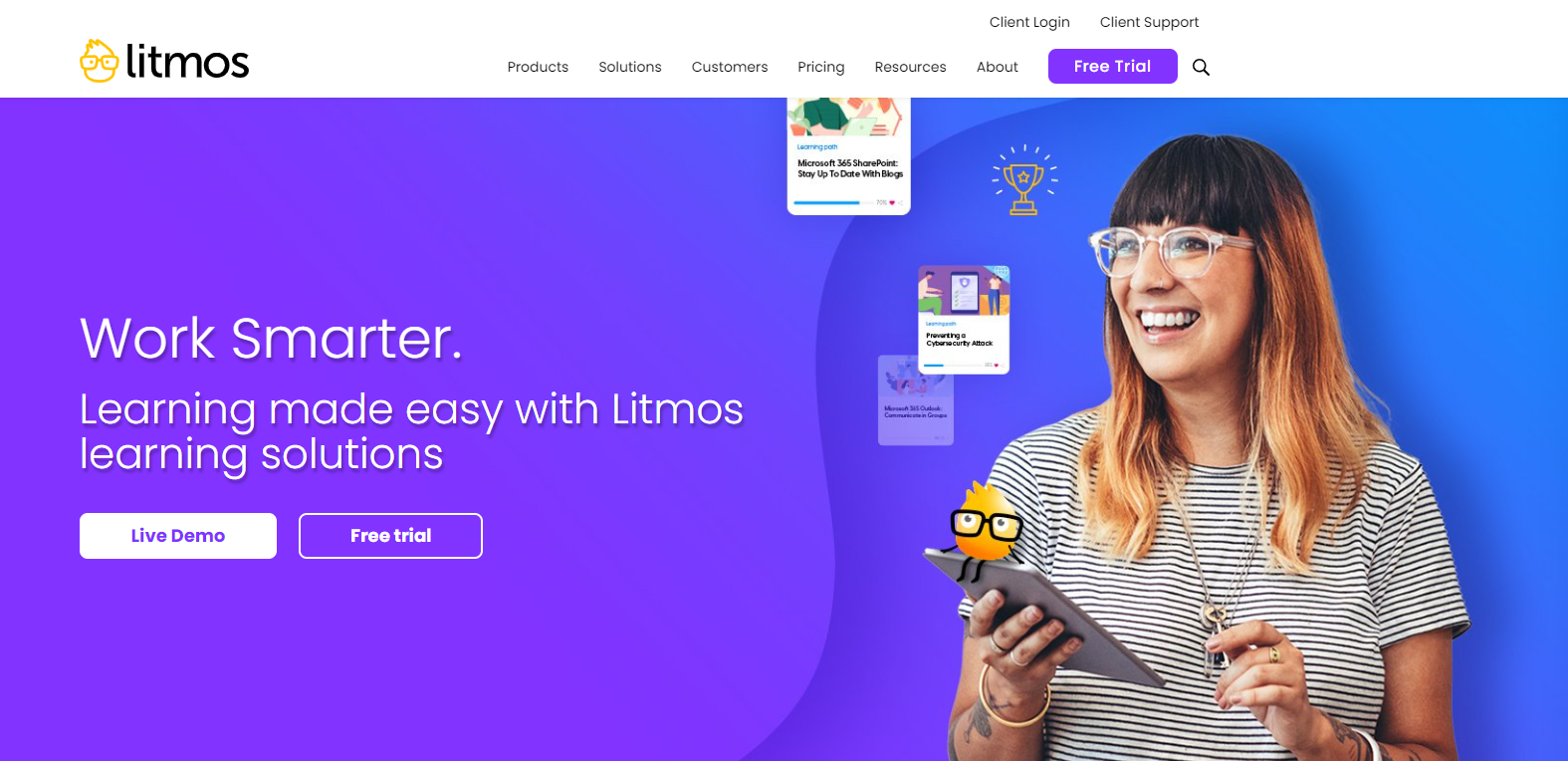University courses are significant as they provide specialized knowledge, develop critical skills, and prepare students for careers. They foster personal growth, intellectual development, and encourage research and innovation. Additionally, they offer networking opportunities, access to resources, and a platform for personal and professional connections. University courses shape individuals, empower them with expertise, and pave the way for future success.
5 Advantages of Online College Courses Over Offline Courses
Flexibility
Online courses offer greater flexibility in terms of scheduling. Students can access course materials and lectures at their convenience, allowing them to balance their studies with work, personal commitments, or other responsibilities.
Accessibility
Online courses eliminate geographical barriers, enabling students to access quality education regardless of their location. This accessibility promotes inclusivity and allows individuals to pursue higher education without the need for relocation.
Personalized Learning
Online courses often provide personalized learning experiences. Students can learn at their own pace, review materials as needed, and receive individualized feedback from instructors. This tailored approach enhances comprehension and promotes effective learning.
Diverse Learning Resources
Online courses leverage digital technologies to offer a wide range of learning resources. These may include multimedia presentations, interactive simulations, discussion forums, and access to digital libraries. Students can benefit from diverse materials that cater to different learning styles.
Enhanced Collaboration
Online courses foster collaboration among students from various backgrounds and locations. Virtual discussion boards, group projects, and online forums facilitate interaction and knowledge-sharing, allowing students to engage in meaningful discussions and broaden their perspectives.
How to choose the best online course software?
Functionality and Flexibility: Select a software that offers comprehensive features and flexibility to meet various teaching needs. Ensure it includes essential functions like online classrooms, assignment management, student tracking, and assessment capabilities, with options for customization.
User Experience and Ease of Use: Consider the software’s user interface and learning experience. Choose a platform that is intuitive, user-friendly, and provides a seamless experience for both teachers and students, promoting ease of use and engagement.
Data Analysis and Reporting: A good online course software should have robust data analysis and reporting features, providing real-time insights into student performance and progress. This enables teachers to monitor student learning and make data-driven instructional adjustments.
6 Best Online Course Software for Universities to Conduct Online Courses
Final LMS
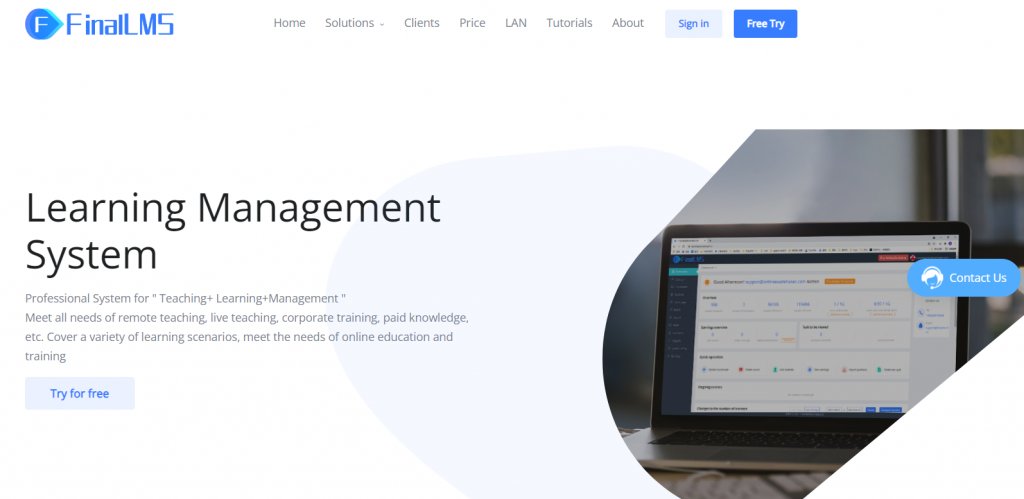
Final LMS is a professional, easy-to-use, and powerful online training system suitable for universities to conduct online courses. It offers a comprehensive solution for course creation, live interactive sessions, paid courses, and learning management. With features like diverse courseware, synchronized multi-device support, comprehensive data statistics, and intellectual property protection, Final LMS optimizes the learning experience, reduces training costs, and ensures efficient and secure online education. Trusted by many customers, it is a reliable choice for universities.
Key features:
1.Comprehensive Solution: Final LMS provides a one-stop solution for online course creation, live interactive sessions, paid courses, and learning management. It covers all aspects of online education, making it convenient and efficient for universities to deliver their courses.
2.Diverse Courseware: The platform supports various types of course content, including graphics, videos, H5, PPT animation courses, and live lessons. This diversity engages students and enhances their learning experience.
3.Multi-Device Support: Final LMS allows students to access and study courses on multiple devices, such as mobile phones and PCs. The synchronization of data between devices enables students to learn anytime and anywhere, promoting flexibility and convenience.
4.Comprehensive Data Statistics: The platform offers detailed data statistics, including course progress, learning time, and points. This information helps instructors track students’ progress, identify areas for improvement, and make data-driven decisions to enhance the learning process.
5.Intellectual Property Protection: Final LMS includes features like anti-screen recording and screen switching warning to protect the intellectual property of course content. It helps prevent unauthorized distribution or copying of course materials, ensuring the integrity and value of the university’s educational resources.
Blackboard Learn
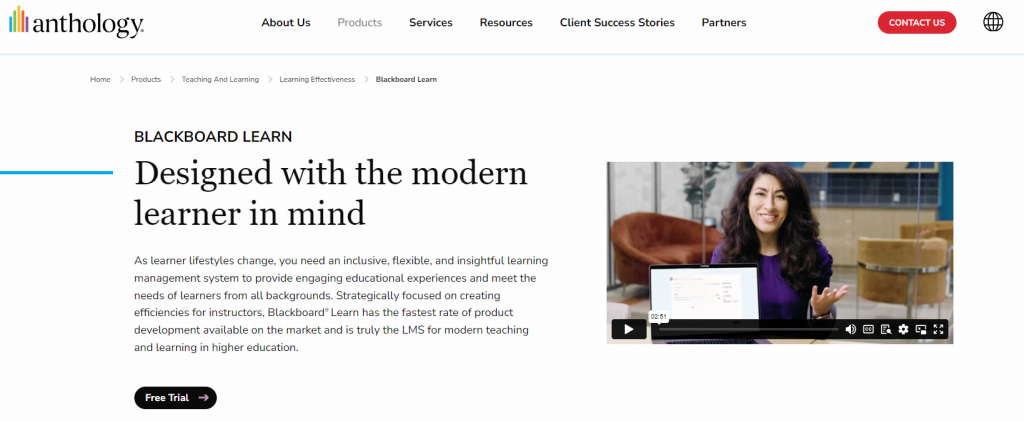
Blackboard Learn is an inclusive and flexible learning management system designed for higher education. With market-leading AI functionality, enhanced assessment experiences, and a focus on creating an inclusive learning environment, it provides engaging educational experiences for students from all backgrounds. It also offers insights to drive student success and evolves in collaboration with the global learning community. Blackboard Learn is the ideal platform for universities to deliver online courses.
Key features:
1.Inclusive and Flexible: Blackboard Learn is designed to cater to the diverse needs of learners from all backgrounds. It offers flexible course structures, accessibility features, and mobile compatibility, ensuring an inclusive learning experience for all students.
2.Advanced AI Capabilities: The platform leverages artificial intelligence to enhance course development and delivery. AI-powered tools assist instructors in creating engaging content, automating assessments, and providing personalized learning experiences.
3.Robust Assessment Tools: Blackboard Learn provides a range of assessment options, allowing instructors to design and deliver various types of assessments, including quizzes, assignments, and discussions. It also offers efficient grading and feedback mechanisms to support student progress.
4.Collaborative Learning Environment: The platform fosters collaboration and interaction among students and instructors. It provides communication tools, discussion boards, group projects, and virtual classrooms, facilitating active engagement and knowledge sharing.
5.Data-driven Insights: Blackboard Learn offers comprehensive analytics and reporting features. Instructors can track student progress, identify areas for improvement, and intervene when necessary. These insights enable data-informed decision-making and interventions for student success.
D2L Brightspace
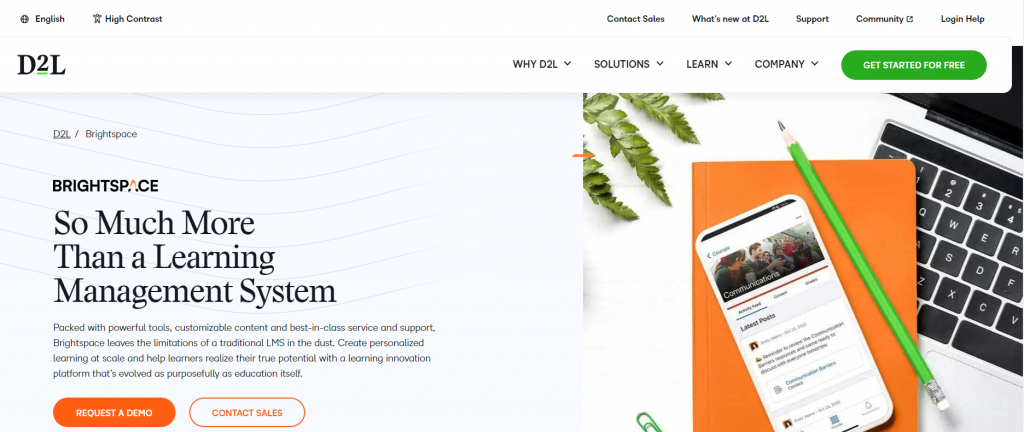
D2L Brightspace is an ideal platform for universities to deliver online courses, offering powerful tools, customizable content, and exceptional support. With its user-friendly interface and mobile accessibility, it enables seamless teaching and learning experiences. D2L Brightspace promotes engagement, personalization, and student success, allowing universities to deliver high-quality education regardless of location or learning preferences.
Key features:
1.Powerful Course Management: Brightspace provides robust course management tools, allowing instructors to organize and deliver course content efficiently. It supports multimedia integration, assignment management, discussion forums, and grade tracking.
2.Personalized Learning: The platform enables personalized learning experiences through adaptive learning paths, customizable content, and individualized feedback. Students can progress at their own pace and receive tailored support based on their unique needs.
3.Collaboration and Communication: Brightspace facilitates seamless collaboration and communication among students and instructors. It offers discussion boards, real-time messaging, video conferencing, and group workspaces, fostering engagement and interaction within the online learning community.
4.Assessment and Feedback: The platform offers various assessment tools, including quizzes, assignments, and exams. It supports automated grading, detailed feedback, and analytics, enabling instructors to monitor student progress, identify areas of improvement, and provide timely feedback.
5.Analytics and Reporting: Brightspace provides robust analytics and reporting features to track student performance, engagement, and course effectiveness. Instructors can gain insights into learner behavior, identify trends, and make data-driven decisions to enhance teaching and learning outcomes.
Schoox
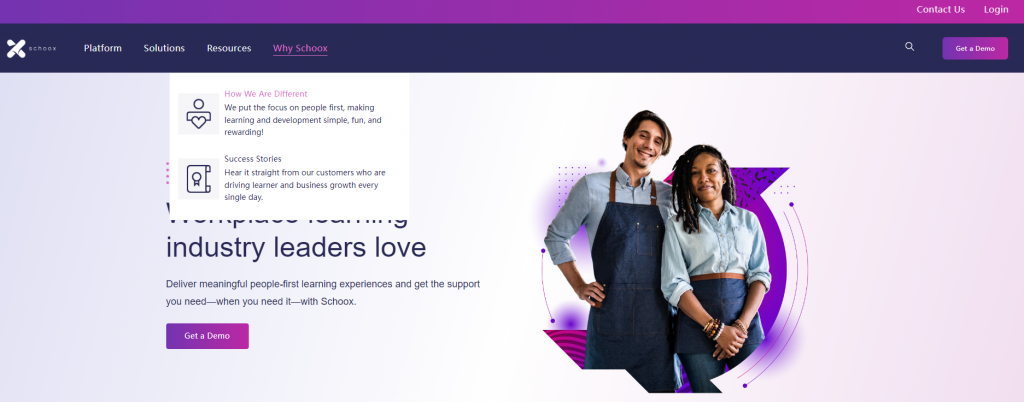
Schoox is an ideal platform for universities to deliver online courses due to its comprehensive learning features, customizable content creation, seamless integration with existing systems, and robust analytics and reporting capabilities. It empowers learners with personalized and engaging experiences while providing administrators with efficient and scalable tools to manage and track student progress.
Key features:
1. Content Creation: Schoox allows users to create engaging learning experiences by leveraging content from various sources. This includes the ability to develop custom courses or curate content from external providers, enabling universities to deliver comprehensive online courses.
2. Learning Management System (LMS): Schoox’s LMS functionality empowers learners by providing a user-friendly interface and intuitive navigation. It supports blended learning approaches, including eLearning, instructor-led training, microlearning, and mobile learning, catering to diverse learning preferences.
3. Social Learning: Schoox facilitates social learning and collaboration among students. It promotes knowledge sharing, gamification, and crowdsourcing, fostering a sense of community and engagement within the online learning environment.
4. Analytics and Reporting: The platform offers robust analytics and reporting capabilities, allowing universities to track learner progress, assess the effectiveness of courses, and gain valuable insights into the impact of their online programs on student performance and engagement.
5. Integration and Scalability: Schoox integrates seamlessly with existing systems, such as HRIS, CRM, and productivity tools, ensuring a smooth learning experience for both administrators and learners. The platform is scalable, enabling universities to expand their online learning programs and accommodate a growing number of students.
Litmos
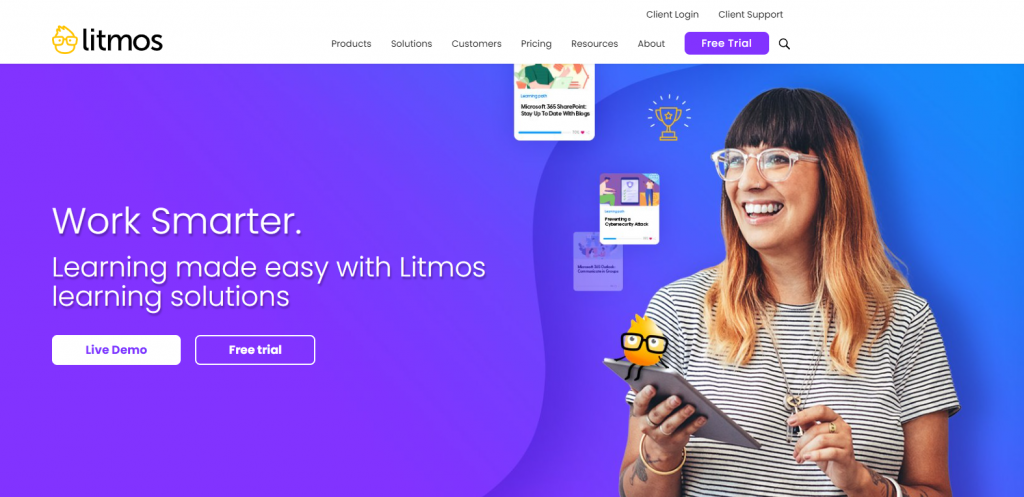
Litmos is an ideal choice for universities to deliver online courses due to its user-friendly learning management system, robust off-the-shelf training content, flexible deployment and integration options, comprehensive reporting and analytics, and universal accessibility features. It empowers universities to create engaging courses, track student progress effectively, and provide accessible learning experiences for students from anywhere.
Key features:
1.Learning Management System (LMS): Litmos provides a user-friendly LMS that simplifies the management and delivery of online courses. It offers features like course creation, enrollment management, progress tracking, and grading, making it easy for universities to organize and administer their online courses.
2.Off-the-Shelf Training Content: Litmos offers a wide range of ready-to-use training courses and collections. These pre-built courses cover various topics such as compliance, leadership, communication, and more, allowing universities to quickly deploy high-quality content without the need for extensive course development.
3.Deployment and Integration: Litmos enables quick deployment and seamless integration with other systems. It offers a variety of connectors and open APIs, allowing universities to integrate Litmos with existing tools and platforms, such as HR systems or content authoring tools.
4.Reporting and Analytics: Litmos provides robust reporting and analytics capabilities. It allows universities to track learner progress, measure performance, monitor course completion rates, and gain valuable insights through built-in reporting and analytics tools. This data helps universities assess the effectiveness of their online courses and make data-driven decisions for improvement.
5.Universal Accessibility: Litmos ensures universal accessibility by offering training that is accessible from anywhere, at any time, both online and offline. The platform supports multiple languages and accommodates learners with disabilities, eliminating barriers to learning and making education more inclusive
Sakai LMS
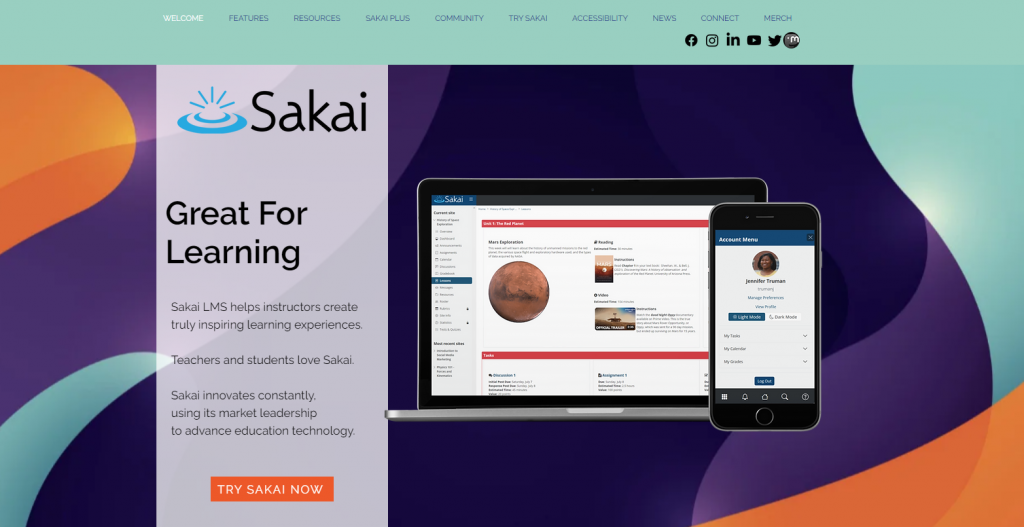
Sakai LMS is an excellent choice for universities to deliver online courses due to its open-source nature, educator-driven development, exceptional course creation capabilities, robust communication options, and easy integration with third-party apps. It empowers educators and students with a feature-rich, customizable learning experience and provides a community-driven ecosystem that prioritizes privacy and ownership of student data.
Key features:
1.Educator-Driven Development: Sakai is fully open source and developed by educators for educators. This means that its features and functionalities are designed based on the needs and feedback of teachers and faculty members, ensuring a user-centric learning experience.
2.Robust Course Creation: Sakai provides comprehensive tools for creating and organizing course content. Educators can easily structure lessons or modules, incorporate various media types (text, quizzes, videos, etc.), control access to materials, and upload/share files and resources.
3.Communication and Collaboration: Sakai offers a wide range of communication options and group-aware tools. It enables real-time messaging, discussions, social connections, and collaborative work, fostering active engagement and interaction among students and instructors.
4.Easy Integration with Third-Party Apps: Sakai is a leader in implementing the IMS LTI specification and provides an extensive API. This allows seamless integration with third-party applications, enabling universities to leverage additional tools and resources within the Sakai ecosystem.
5.Community-Driven Environment: Sakai’s open-source community actively participates in shaping the platform’s features, strategy, and development. Educators and institutions can contribute to the product roadmap and collaborate with others to meet the evolving needs of instructors and students.
